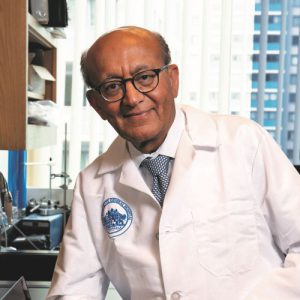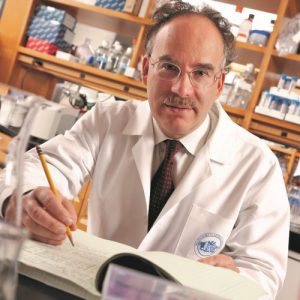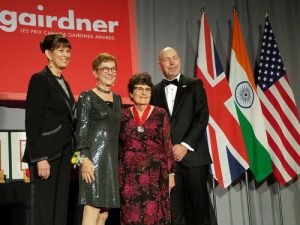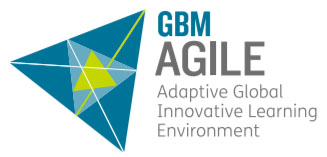Notable Cancer Research Achievements – 2019 SNAPSHOT
Made Possible by National Foundation for Cancer Research Supporters
NFCR provides outstanding researchers with the vital seed funding they need in their laboratories to pursue the next advancement in cancer research—more than $380 million since 1973. NFCR-funded scientists are leading the way into a new era of cancer prevention, detection and treatment. We are committed to helping scientists translate promising cancer discoveries into cures by funding their innovative research.
If you prefer to download this as a PDF, please click here.
RESEARCH HIGHLIGHTS MADE POSSIBLE WITH YOUR SUPPORT
Target Therapy For Brain Cancer In Clinics
NFCR-funded scientist, Paul B. Fisher, M.Ph., Ph.D., believes in “thinking outside the box” to generate new research discoveries. Thanks to Dr.Fisher’s inventive philosophy, he and his team discovered genetically engineered viruses known as Cancer Terminator Viruses (CTV’s), designed to carry anti-cancer agents only to cancer cells, leaving healthy cells untouched. When paired with a powerful immune system modulator, also discovered by Dr. Fisher’s team, this CTV causes primary and metastatic cancer cells to “commit suicide.”
Dr. Fisher’s therapy is scheduled for use in clinical trials for patients with glioblastoma multiform (GBM), the aggressive brain cancer claiming lives only 15 months after diagnosis. Continued funding will allow patients diagnosed with metastatic prostate, breast, pancreatic and other cancers to experience this groundbreaking cancer treatment. Please help support his cutting-edge research.
Molecular Imaging Improves Detection and Strategic Removal of Cancer Cells
James Basilion, Ph.D. is developing a dual-purpose and sensitive imaging probe. It will allow surgeons to “see” and detect prostate cancer cells for better surgical removal. With light activation, the probe can then destroy missed cancer cells and those too risky to remove by surgery. The probe reduces surgical side effects by leaving healthy tissue intact and will reduce the change of deadly metastasis (when cancer spreads to other parts of the body). The powerful probe, which applies to other cancer types, may soon reach clinical trials.
Standard Hypertensive Drug Improves Chemotherapy Response in Ovarian, Breast & Pancreatic Cancers
Cancers can develop resistance to chemotherapy – a significant unmet clinical need for patients and their doctors. Rakesh K. Jain, Ph.D. addressed this challenge by focusing on the layers of fat, immune and other cells (stroma) which compress blood vessels surrounding some tumors and hinder the delivery of chemotherapy, resulting in chemo-resistance. His team discovered that a drug commonly used to control hypertension reduces the stroma surrounding pancreatic, breast and ovarian tumors, allowing for increased blood supply to effectively deliver chemotherapy.
A clinical trial combining the drug with chemotherapy has shown very promising results against pancreatic cancer – the 3rd deadliest type of cancer. With continued research, this combination treatment may give patients with the ‘silent killer’ – ovarian cancer – hope for an effective treatment to save their lives.
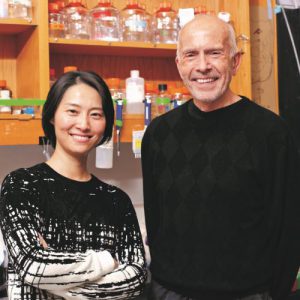
Ancient Enzymes for Protein Synthesis May Help Activate the Immune System to Fight Cancer
The importance of our immune system for keeping cancer at bay has been beautifully demonstrated by the recent success of cancer immunotherapy. Paul Schimmel, Ph.D. and Xiang-Lei Yang, Ph.D. are leading experts in the study of the exquisite enzymes that synthesize all proteins present since very early in evolution. In recent years, they discovered that these enzymes also carry other vital, yet unexpected biological roles. Their latest research shows that one enzyme – SerRS – may activate the immune system to combat cancer. Stay tuned as this research is under close investigation as a potential new cancer immunotherapy.
Cutting-edge CRISPR Technology: Identify Genes to Suppress the Metastatic Recurrence of Breast Cancer
Cancer cells that migrate from primary tumors and become circulating tumor cells (CTCs) in the blood can metastasize to a vital organ. Daniel Haber, M.D., Ph.D. is using the gene-editing tool, CRISPR, to identify and turn on or off the genes that regulate the ability of CTC’s metastasize from breast tumors. Several candidate genes have been identified. Ultimately, therapies will be developed that suppress the genes and give women greater hope for surviving the metastatic recurrence of breast cancer.
Precision Oncology: Customized Treatment Regimens for Patients
One of the hallmarks of cancer is chromosomal instability (CIN) or alterations in chromosome number or structure. Precision oncology leader, Wei Zhang, Ph.D, suggests CIN can significantly affect how tumors change and respond to therapy and it could be an option for selecting therapy and targeting chemotherapy resistant cancer. While the field of precision medicine is still in its infancy, NFCR knows the vast promise it holds: with the rise of genomics, scientists can untangle the genetic knot of cancer, tailoring customized treatment regimens for each patient.
NFCR Scientist Awarded 2019 Canada Gairdner International Award
Susan Band Horwitz, Ph.D., of Albert Einstein College of Medicine (2nd from right in photo) received this coveted award for defining novel mechanisms of action and resistance of drugs of natural product origin, most significantly Taxol®, and promoting their use for treatment of cancer. When she first began her research on this natural product, there was little interest from the field in its potential. Thanks to her crucial role in its development, Taxol is now an FDA-approved anti-tumor drug, and is recognized for its importance in treating ovarian, breast and lung carcinomas, as well as Kaposi’s Sarcoma. It has been given to millions of cancer patients worldwide.
NFCR is proud to be part of Dr. Horwitz’s scientific journey for the last two decades, providing more than $1.5 million in funding for her laboratory. Her significant research advancements are a prime example of NFCR’s funding philosophy to provide seed funding and flexibility for innovative ideas and long-term support to nurture research to reach its fruition. We congratulate Dr. Horwitz on her outstanding achievements.
IMMUNOTHERAPY SAVES MELINDA’S LIFE
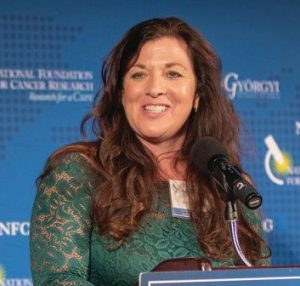
As a mother of six children, terminal was not a word that I was willing to accept. I began treatment, two six-month rounds of aggressive chemotherapy that ultimately failed to work and left me with a miserable quality of life. I made the difficult decision to stop the treatment and look for alternative options.
I was a matched candidate for a unique trial that involved adoptive cell therapy, using my own immune system to fight off the cancer. With the combination of a novel approach and my body’s own defenses, the cancer has been kept at bay. Here I am today, 10 years later.
I attribute this to the wonderful advancements in cancer research, the brilliant minds of researchers and scientists, the many cancer fighting organizations like NFCR, and donors like you who make all this possible.”
— Melinda Bachini
SUPPORTING THE FIGHT AGAINST CHILDHOOD CANCER

Every year over 300,000 children under the age of 18 are diagnosed with cancer and 90,000 children lost their lives. This number is too high – we must do more to save our children and act quickly.
NFCR is committed to making a difference for children and families facing this devastating disease by funding leading scientists working on the development of new drugs designed specifically for pediatric patients. Your help is critically needed, and time is of the essence.
Please make an impact in a young child’s life by donating today to NFCR’s Pediatric Research Fund. Together we can give our children a chance to beat cancer and live long, healthy lives!
NFCR’S NEW CANCER PATIENT NAVIGATION HOTLINE
Thanks to a matching grant received from The Safeway Foundation, we are pleased to share our new patient hotline.
A cancer diagnosis comes with panic, confusion, uncertainty and questions: What tests should be scheduled? What are the best treatment options? How to communicate the diagnosis with friends and family members?
NFCR is HERE to HELP. The hotline provides free assistance through the difficult time by linking a person in need or their family member with our certified oncology nurses (Navigators) and our elite medical team.
- Understand the diagnosis and treatment options
- Obtain additional opinions from experts and suggestions for treatment
- Get recommendations for top oncologists to meet specific needs and help in coordinating that referral process
- Learn about clinical trials and the newest therapies for advanced cancer or rare tumors for which no standard care or effective therapy is available
Want More Information?
For more information or to connect with our hotline, please click here or call Dr. Hali Hartmann, Director of Scientific Relations, at (502) 690-6698.
GIVING NEW HOPE TO BRAIN CANCER PATIENTS
Glioblastoma Multiforme (GBM) is the deadliest brain cancer with a dismal 3-5% survival rate for the 240,000 patients worldwide diagnosed annually. To address this health crisis, NFCR, led by CEO Dr. Sujuan Ba, has played an instrumental role in forming GBM AGILE, the world’s first adaptive clinical trial to improve the survival of GBM patients. This global force included over 150 neurosurgeons, neuro oncologists, pathologists and other leading doctors and scientists.
NFCR’s strong financial support of GBM AGILE in the millions of dollars enabled trial sites to begin enrolling patients at cancer care centers in seven U.S. cities in 2019. More U.S. sites will open by year-end, and sites in Europe, China and Canada are scheduled to open in 2020.
GBM AGILE enables multiple drugs and drug combinations to be screened simultaneously, lowering cost, time, and the number of patients required to evaluate potential new therapies. Please support GBM AGILE to give new hope to brain cancer patients worldwide.
THE POWER OF YOUR DONATION
Help NFCR continue to provide essential funding for innovative research that will lead to a cure of cancer. One discovery at a time, we are getting closer to our shared goal – finding cures for all types of cancer.
$100
Performs one biopsy from a patient’s tumor for a variety of tests and analyses that will help determine the best treatment and patient’s prognosis
$250
Buys one case of petri dishes for growing cancer cells – an essential first step to identify tumor markers or test treatment effectiveness of new drugs
$500-750
Buys one antibody test to determine whether tumor cells have a specific marker for drug resistance
$1k – 2.5k
Carries out a comprehensive genome-wide analysis on all genes in one tumor sample, for developing targeted and personalized cancer therapies
$2.5k
Tests anti-cancer effects of natural product drugs in cell lines of ovarian, lung and triple negative breast cancers resistant to standard drugs
$5k
Conducts single cell RNA sequencing on biopsy samples from 3 pancreatic cancer patients to provide them the best targeted therapy
$10k
Purchases 5,000 compounds to identify new drugs that inhibit metastasis of prostate cancer in bone
$25k
Supports a Research Fellow to conduct critical laboratory cancer research for a year
$100k
Supports a Research Fellow to conduct critical laboratory cancer research for a year
$250k – $1M
Advances critically needed pre- clinical research in order to move the discoveries forward into clinical trials to treat patients
HOW YOU CAN GIVE
Gifts to NFCR can be made in a variety of forms to best align with your needs and charitable intent. Gifts can be made in honor or memory of a friend, colleague and/or a loved one. Popular ways to give at the end of the year include:
“Cash” Gifts can be made by check, credit card, online at nfcr.org, or via a donor advised fund.
Click to make a donation now.
Gifts of Stock (long-term securities, including stocks and bonds) can be a source of significant tax benefit by eliminating capital gains taxes as well as receiving an applicable tax deduction.
Charitable IRA Rollovers are gifts made directly from a traditional IRA to NFCR. Donors must be at least 70 ½ years old. While not income tax deductible, these types of gifts may help a donor with meeting his/her annual IRA required minimum distribution and provide other tax benefits. Simply contact your IRA custodian and ask them to direct your distribution to NFCR.
Charitable Gift Annuities are gifts that provide guaranteed income to a donor for life (and/or life of a spouse) with a portion eligible for a tax deduction.
Wills or Living Trusts are popular because they are easy to arrange and may be changed at any time you choose. A provision or amendment prepared by your attorney is all that is necessary.





